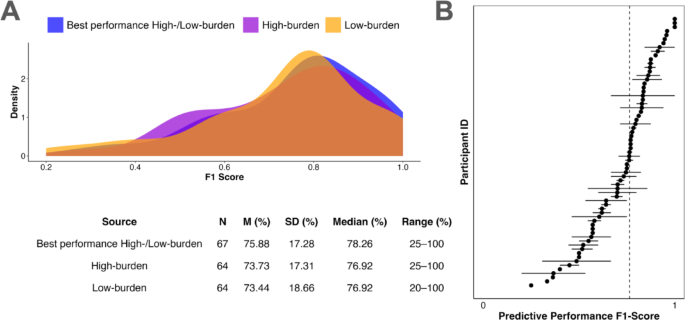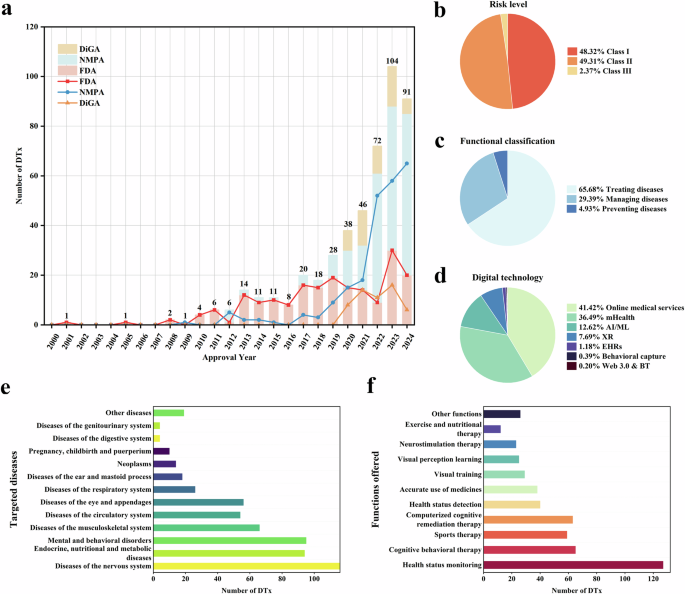The impact of using reinforcement learning to personalize communication on medication adherence: findings from the REINFORCE trial

Lauffenburger, J. C. & Choudhry, N. K. Text messaging and patient engagement in an increasingly mobile world. Circulation 133, 555–556 (2016).
Google Scholar
ElSayed, N. A. et al. Glycemic targets: standards of care in diabetes-2023. Diabetes Care 46, S97–S110 (2023).
Google Scholar
ElSayed, N. A. et al. Pharmacologic approaches to glycemic treatment: standards of care in diabetes-2023. Diabetes Care 46, S140–S157 (2023).
Google Scholar
Hamine, S., Gerth-Guyette, E., Faulx, D., Green, B. B. & Ginsburg, A. S. Impact of mHealth chronic disease management on treatment adherence and patient outcomes: a systematic review. J. Med. Internet Res. 17, e52 (2015).
Google Scholar
Hartz, J., Yingling, L. & Powell-Wiley, T. M. Use of mobile health technology in the prevention and management of diabetes mellitus. Curr. Cardiol. Rep. 18, 130 (2016).
Google Scholar
Dobson, R., Whittaker, R., Pfaeffli Dale, L. & Maddison, R. The effectiveness of text message-based self-management interventions for poorly-controlled diabetes: a systematic review. Digit. Health 3, 2055207617740315 (2017).
Google Scholar
Keller, P. A. Affect, framing, and persuasian. J. Mark. Res. 40, 54–64 (2003).
Google Scholar
Gong, J. et al. The framing effect in medical decision-making: a review of the literature. Psychol. Health Med. 18, 645–653 (2013).
Google Scholar
Yokum, D., Lauffenburger, J. C., Ghazinouri, R. & Choudhry, N. K. Letters designed with behavioural science increase influenza vaccination in Medicare beneficiaries. Nat. Hum. Behav. 2, 743–749 (2018).
Google Scholar
Petty R. E. & Cacioppo J. T. The Elaboration Likelihood Model of Persuasion, (Springer Series in Social PsychologyL, 1986).
Thakkar, J. et al. Mobile telephone text messaging for medication adherence in chronic disease: a meta-analysis. JAMA Intern. Med. 176, 340–349 (2016).
Google Scholar
Garofalo, R. et al. A randomized controlled trial of personalized text message reminders to promote medication adherence among HIV-positive adolescents and young adults. AIDS Behav. 20, 1049–1059 (2016).
Google Scholar
Sahin, C., Courtney, K. L., Naylor, P. J. & Rhodes, R. E. Tailored mobile text messaging interventions targeting type 2 diabetes self-management: a systematic review and a meta-analysis. Digit. Health 5, 2055207619845279 (2019).
Google Scholar
Choudhry, N. K. et al. Effect of a remotely delivered tailored multicomponent approach to enhance medication taking for patients with hyperlipidemia, hypertension, and diabetes: the STIC2IT cluster randomized clinical trial. JAMA Intern. Med. 178, 1182–1189 (2018).
Google Scholar
Choudhry, N. K. et al. Rationale and design of the Study of a Tele-pharmacy Intervention for Chronic diseases to Improve Treatment adherence (STIC2IT): A cluster-randomized pragmatic trial. Am. heart J. 180, 90–97 (2016).
Google Scholar
Lauffenburger, J. C. et al. Impact of a novel pharmacist-delivered behavioral intervention for patients with poorly-controlled diabetes: the ENhancing outcomes through Goal Assessment and Generating Engagement in Diabetes Mellitus (ENGAGE-DM) pragmatic randomized trial. PloS one 14, e0214754 (2019).
Google Scholar
Kassavou, A. et al. A highly tailored text and voice messaging intervention to improve medication adherence in patients with either or both hypertension and Type 2 diabetes in a UK primary care setting: feasibility randomized controlled trial of clinical effectiveness. J. Med. Internet Res. 22, e16629 (2020).
Google Scholar
Nelson, L. A. et al. Effects of a tailored text messaging intervention among diverse adults with Type 2 diabetes: evidence from the 15-Month REACH randomized controlled trial. Diabetes Care 44, 26–34 (2021).
Google Scholar
Hornstein, S., Zantvoort, K., Lueken, U., Funk, B. & Hilbert, K. Personalization strategies in digital mental health interventions: a systematic review and conceptual framework for depressive symptoms. Front. Digit. Health 5, 1170002 (2023).
Google Scholar
Tong, H. L. et al. Personalized mobile technologies for lifestyle behavior change: a systematic review, meta-analysis, and meta-regression. Prev. Med. 148, 106532 (2021).
Google Scholar
Trella A. L., et al. Designing Reinforcement Learning Algorithms for Digital Interventions: Pre-Implementation Guidelines. Algorithms. Aug 2022;15 https://doi.org/10.3390/a15080255.
Lauffenburger, J. C. et al. REinforcement learning to improve non-adherence for diabetes treatments by Optimising Response and Customising Engagement (REINFORCE): study protocol of a pragmatic randomised trial. BMJ open 11, e052091 (2021).
Google Scholar
Jordan S. M., Chandak Y., Cohen D., ZHang M. & Thomas P. S. Evaluating the performance of reinforcement learning algorithms. In Proc. Thirty-Seventh International Conference on Machine Learning. 2020 https://proceedings.mlr.press/v119/jordan20a/jordan20a.pdf.
Yom-Tov, E. et al. Encouraging physical activity in patients with diabetes: intervention using a reinforcement learning system. J. Med. Internet Res. 19, e338 (2017).
Google Scholar
Piette, J. D. et al. The potential impact of intelligent systems for mobile health self-management support: Monte Carlo simulations of text message support for medication adherence. Ann. Behav. Med. 49, 84–94 (2015).
Google Scholar
Liu, D., Yang, X., Wang, D. & Wei, Q. Reinforcement-learning-based robust controller design for continuous-time uncertain nonlinear systems subject to input constraints. IEEE Trans. Cyber. 45, 1372–1385 (2015).
Google Scholar
Hochberg, I. et al. Encouraging physical activity in patients with diabetes through automatic personalized feedback via reinforcement learning improves glycemic control. Diabetes Care 39, e59–e60 (2016).
Google Scholar
Liao P., Greenewald K., Klasnja P. & Murphy S. Personalized HeartSteps: A Reinforcement Learning Algorithm for Optimizing Physical Activity. Proc ACM Interact Mob Wearable Ubiquitous Technol. Mar 2020;4 https://doi.org/10.1145/3381007.
Liu, X., Deliu, N. & Chakraborty, B. Microrandomized trials: developing just-in-time adaptive interventions for better public health. Am. J. Public Health 113, 60–69 (2023).
Google Scholar
Guez, A., Vincent, R. D., Avoli, M. & Pineau, J. Treatment of epilepsy via batch-mode reinforcement learning. In Proc. Twenty-Third AAAI Conference on Artificial Intelligence. 2008:1671–1678 https://cdn.aaai.org/IAAI/2008/IAAI08-008.pdf.
Klasnja, P. et al. Micro-randomized trials: an experimental design for developing just-in-time adaptive interventions. Health Psychol. 34, 1220–1228 (2015).
Google Scholar
Komorowski, M., Celi, L. A., Badawi, O., Gordon, A. C. & Faisal, A. A. The artificial intelligence Clinician learns optimal treatment strategies for sepsis in intensive care. Nat. Med. 24, 1716–1720 (2018).
Google Scholar
Collaborators GBDD. Global, regional, and national burden of diabetes from 1990 to 2021, with projections of prevalence to 2050: a systematic analysis for the Global Burden of Disease Study 2021. Lancet. Jun 2023; https://doi.org/10.1016/S0140-6736(23)01301-6.
Kanyongo, W. & Ezugwu, A. E. Feature selection and importance of predictors of non-communicable diseases medication adherence from machine learning research perspectives. Inform. Med. Unlocked. 38, 101132 (2023).
Google Scholar
Kanyongo, W. & Ezugwu, A. E. Machine learning approaches to medication adherence amongst NCD patients: A systematic literature review. Inform. Med. Unlocked. 38, 101210 (2023).
Google Scholar
Cutler, R. L., Fernandez-Llimos, F., Frommer, M., Benrimoj, C. & Garcia-Cardenas, V. Economic impact of medication non-adherence by disease groups: a systematic review. BMJ open 8, e016982 (2018).
Google Scholar
Bitton, A., Choudhry, N. K., Matlin, O. S., Swanton, K. & Shrank, W. H. The impact of medication adherence on coronary artery disease costs and outcomes: a systematic review. Am. J. Med. 126, 357 e7–357.e27 (2013).
Google Scholar
Arambepola, C. et al. The impact of automated brief messages promoting lifestyle changes delivered via mobile devices to people with Type 2 diabetes: a systematic literature review and meta-analysis of controlled trials. J. Med. Internet Res. 18, e86 (2016).
Google Scholar
Bobrow, K. et al. Mobile phone text messages to support treatment adherence in adults with high blood pressure (SMS-Text Adherence Support [StAR]): a single-blind, randomized trial. Circulation 133, 592–600 (2016).
Google Scholar
Pandey, A., Krumme, A., Patel, T. & Choudhry, N. The impact of text messaging on medication adherence and exercise among postmyocardial infarction patients: randomized controlled pilot trial. JMIR Mhealth Uhealth 5, e110 (2017).
Google Scholar
Paredes P G-BR, Czerwinski M., Roseway A., Rowan K. & Hernandez J. PopTherapy: coping with stress through pop-culture. 109–117 (2014) https://dl.acm.org/doi/10.4108/icst.pervasivehealth.2014.255070.
Lauffenburger, J. C. et al. Comparison of a new 3-item self-reported measure of adherence to medication with pharmacy claims data in patients with cardiometabolic disease. Am. heart J. 228, 36–43 (2020).
Google Scholar
Shrank, W. H. et al. Are caregivers adherent to their own medications? J. Am. Pharmacists Assoc 51, 492–498 (2011).
Google Scholar
Mehta S. J. et al. Comparison of pharmacy claims and electronic pill bottles for measurement of medication adherence among myocardial infarction patients. Med. care. https://doi.org/10.1097/MLR.0000000000000950.
Arnsten, J. H. et al. Antiretroviral therapy adherence and viral suppression in HIV-infected drug users: comparison of self-report and electronic monitoring. Clin. Infect. Dis. 33, 1417–1423 (2001).
Google Scholar
Franklin, J. M. et al. Group-based trajectory models: a new approach to classifying and predicting long-term medication adherence. Med. Care 51, 789–796 (2013).
Google Scholar
Garber, A. J. et al. Consensus statement by the american association of clinical endocrinologists and american college of endocrinology on the comprehensive TYPE 2 diabetes management algorithm – 2018 executive summary. Endocr. Pr. 24, 91–120 (2018).
Google Scholar
Baptista, S. et al. User experiences with a Type 2 diabetes coaching app: qualitative study. JMIR Diabetes 5, e16692 (2020).
Google Scholar
Aguilera, A. et al. mHealth app using machine learning to increase physical activity in diabetes and depression: clinical trial protocol for the DIAMANTE Study. BMJ Open 10, e034723 (2020).
Google Scholar
Harris, P. A. et al. The REDCap consortium: building an international community of software platform partners. J. Biomed. Inf. 95, 103208 (2019).
Google Scholar
Harris, P. A. et al. Research electronic data capture (REDCap)–a metadata-driven methodology and workflow process for providing translational research informatics support. J. Biomed. Inf. 42, 377–381 (2009).
Google Scholar
Wolf, M. S. et al. Development and validation of the consumer health activation index. Med. Decis. Mak. 38, 334–343 (2018).
Google Scholar
Gardner, B., Abraham, C., Lally, P. & de Bruijn, G. J. Towards parsimony in habit measurement: testing the convergent and predictive validity of an automaticity subscale of the Self-Report Habit Index. Int. J. Behav. Nutr. Phys. Act. 9, 102 (2012).
Google Scholar
Volpp, K. G. et al. Effect of electronic reminders, financial incentives, and social support on outcomes after myocardial infarction: the heartstrong randomized clinical trial. JAMA Intern. Med. 177, 1093–1101 (2017).
Google Scholar
Bandura, A. Self-efficacy: toward a unifying theory of behavioral change. Psychol. Rev. 84, 191–215 (1977).
Google Scholar
Gintis, H. A framework for the unification of the behavioral sciences. Behav. Brain Sci. 30, 1–16 (2007).
Google Scholar
Tzeng, O. C. & Jackson, J. W. Common methodological framework for theory construction and evaluation in the social and behavioral sciences. Genet. Soc. Gen. Psychol. Monogr. 117, 49–76 (1991).
Google Scholar
Lauffenburger, J. C. et al. Preferences for mHealth technology and text messaging communication in patients with Type 2 diabetes: qualitative interview study. J. Med. Internet Res. 23, e25958 (2021). Jun.
Google Scholar
Baron, R. M. Social reinforcement effects as a function of social reinforcement history. Psychol. Rev. 73, 527–539 (1966).
Google Scholar
Lauffenburger J. C., Khan N. F., Brill G., Choudhry N. K. Quantifying social reinforcement among family members on adherence to medications for chronic conditions: a us-based retrospective cohort study. J. General Intern. Med. https://doi.org/10.1007/s11606-018-4654-9.
Viswanathan, M. et al. Interventions to improve adherence to self-administered medications for chronic diseases in the United States: a systematic review. Ann. Intern. Med. 157, 785–795 (2012).
Google Scholar
Krakow, E. F. et al. Tools for the precision medicine era: how to develop highly personalized treatment recommendations from cohort and registry data using Q-learning. Am. J. Epidemiol. 186, 160–172 (2017).
Google Scholar
Laber, E. B., Linn, K. A. & Stefanski, L. A. Interactive model building for Q-learning. Biometrika 101, 831–847 (2014).
Google Scholar
Nahum-Shani, I. et al. Q-learning: a data analysis method for constructing adaptive interventions. Psychol. Methods 17, 478–494 (2012).
Google Scholar
Austin, P. C. Balance diagnostics for comparing the distribution of baseline covariates between treatment groups in propensity-score matched samples. Stat. Med. 28, 3083–3107 (2009).
Google Scholar
Lauffenburger, J. C. et al. Prevalence and impact of having multiple barriers to medication adherence in nonadherent patients with poorly controlled cardiometabolic disease. Am. J. Cardiol. 125, 376–382 (2020).
Google Scholar
Easthall, C., Taylor, N. & Bhattacharya, D. Barriers to medication adherence in patients prescribed medicines for the prevention of cardiovascular disease: a conceptual framework. Int. J. Pharm. Pract. 27, 223–231 (2019).
Google Scholar
link








